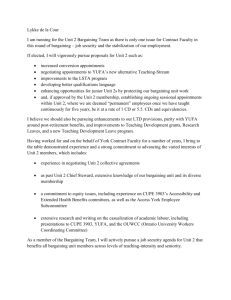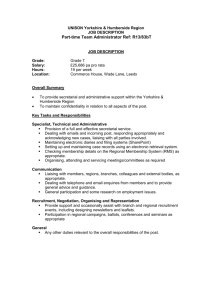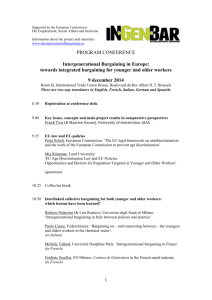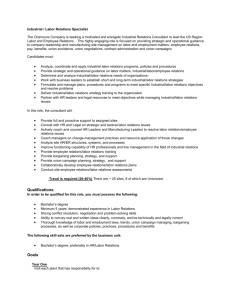Bargaining Update March 2010
advertisement
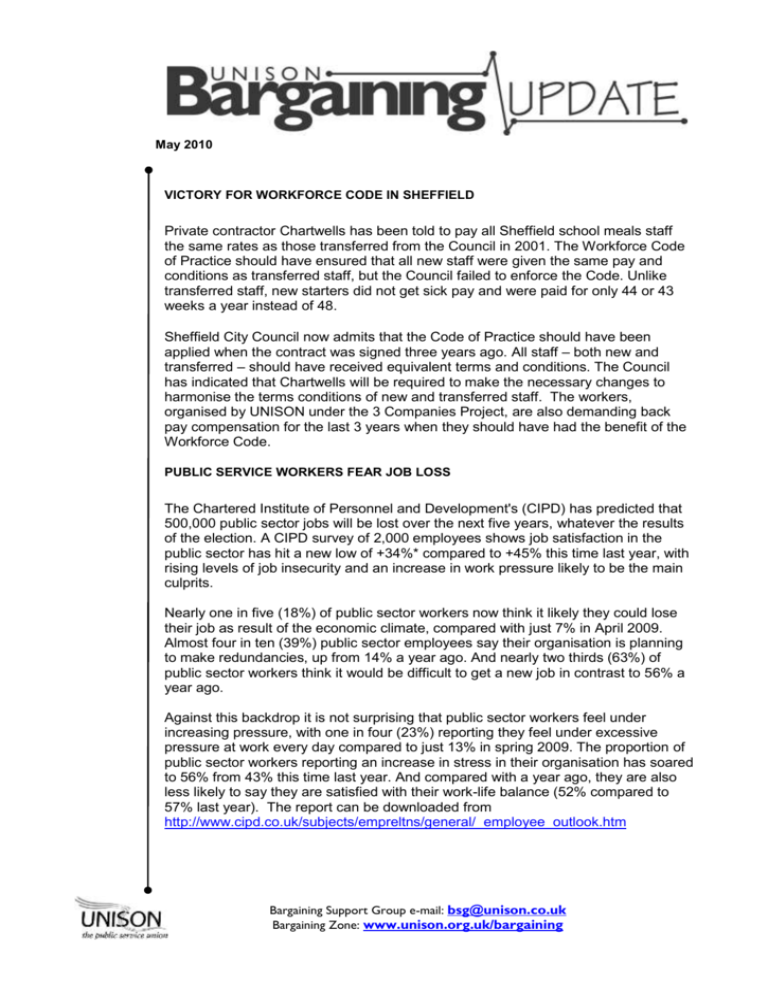
May 2010 VICTORY FOR WORKFORCE CODE IN SHEFFIELD Private contractor Chartwells has been told to pay all Sheffield school meals staff the same rates as those transferred from the Council in 2001. The Workforce Code of Practice should have ensured that all new staff were given the same pay and conditions as transferred staff, but the Council failed to enforce the Code. Unlike transferred staff, new starters did not get sick pay and were paid for only 44 or 43 weeks a year instead of 48. Sheffield City Council now admits that the Code of Practice should have been applied when the contract was signed three years ago. All staff – both new and transferred – should have received equivalent terms and conditions. The Council has indicated that Chartwells will be required to make the necessary changes to harmonise the terms conditions of new and transferred staff. The workers, organised by UNISON under the 3 Companies Project, are also demanding back pay compensation for the last 3 years when they should have had the benefit of the Workforce Code. PUBLIC SERVICE WORKERS FEAR JOB LOSS The Chartered Institute of Personnel and Development's (CIPD) has predicted that 500,000 public sector jobs will be lost over the next five years, whatever the results of the election. A CIPD survey of 2,000 employees shows job satisfaction in the public sector has hit a new low of +34%* compared to +45% this time last year, with rising levels of job insecurity and an increase in work pressure likely to be the main culprits. Nearly one in five (18%) of public sector workers now think it likely they could lose their job as result of the economic climate, compared with just 7% in April 2009. Almost four in ten (39%) public sector employees say their organisation is planning to make redundancies, up from 14% a year ago. And nearly two thirds (63%) of public sector workers think it would be difficult to get a new job in contrast to 56% a year ago. Against this backdrop it is not surprising that public sector workers feel under increasing pressure, with one in four (23%) reporting they feel under excessive pressure at work every day compared to just 13% in spring 2009. The proportion of public sector workers reporting an increase in stress in their organisation has soared to 56% from 43% this time last year. And compared with a year ago, they are also less likely to say they are satisfied with their work-life balance (52% compared to 57% last year). The report can be downloaded from http://www.cipd.co.uk/subjects/empreltns/general/_employee_outlook.htm Bargaining Support Group e-mail: bsg@unison.co.uk Bargaining Zone: www.unison.org.uk/bargaining BARGAINING AROUND THE WORLD CUP An Industrial Relations Service (IRS) survey of 100 employers, due for publication in the middle of May, has found that many employers have plans to allow employees to follow the football World Cup during their working day. Employers believe that being flexible around the World Cup will have a positive effect overall on business. IRS has provided a set of model policies that could be used to allow staff additional time off to watch games, including providing facilities at work. Suggested policies cover flexible working, shift swaps, attendance and discipline. Branches should consider negotiating agreements to cover the World Cup and other special sporting events. WOMEN FIND WORKLIFE BALANCE HARD TO ACHIEVE A new report confirms that inequalities in childcare and household work are still restricting the opportunities for women to get the most out of paid employment. The report, from the International TUC highlights the fact that the uneven share of household and childcare duties has a deep impact on career prospects and on working patterns. The data confirms that the gender pay gap remains a serious problem and that the gap is much wider for women with children. The report also shows that countries which ratify and implement ILO Conventions covering equality, protection from discrimination, maternity rights and workers with family responsibilities have significantly better laws to support a decent balance between work and family life. The UK has ratified two of the four ILO Conventions considered in the report – equal remuneration and discrimination – but not the convention on equal opportunities for workers with family responsibilities. To see the full report Decisions for Work: An Examination of the Factors Influencing Women’s Decisions for Work, visit http://www.ituc-csi.org/ituc-report-decisionsforwork.html POSITIVELY PUBLIC BRIEFING This month’s Positively Public Briefing is out now. To view the latest edition click on the link below. http://www.unison.org.uk/PositivelyPublic/ppbriefing.asp INFLATION Negotiations over April 2010 deals have been taking place against a very different backdrop from those settling in January. Headline inflation rose sharply from 0.3% in November 2009 to 3.7% in January and February 2010. The RPI annual inflation rate rose again to 4.4% in March 2010. IRS's panel of expert economic commentators expect RPI to peak at an average of 4% over the second quarter of 2010, before starting to fall back. Bargaining Support Group e-mail: bsg@unison.co.uk Bargaining Zone: www.unison.org.uk/bargaining CPI annual inflation – the Government’s target measure – rose by 3.4% in the year to March 2010, up from 3% a month earlier. CPI excludes housing costs, which can make up half of peoples’ expenditure, and so should not be used in bargaining. To find out more about RPI inflation take a look at UNISON’s RPI factsheet at: http://www.unison.org.uk/acrobat/B262.pdf AVERAGE WEEKLY EARNINGS AND LATEST PAY SETTLEMENTS Average earnings growth including bonuses increased in the year to February 2010, from the January rate of 0.8% to 2.3% in February 2010. Growth in average earnings excluding bonuses (regular pay) also increased from the January 2010 rate of 1.5% to 1.7% in February 2010. In the year to February pay growth (including bonuses) in the private sector stood at 1.8% compared with 3.7% in the public sector. Excluding bonus payments, growth in the private sector stood at 0.9% compared with 3.9% in the public sector. For further explanation of the current disparity between public and private sector pay, see this factsheet: http://www.unison.org.uk/file/Public%20private%20sector%20pay%20arguments.doc The IRS measure of pay awards - the midpoint in the range of basic pay deals - stands at 1% in the three months to March 2010, unchanged from the previous rolling quarter. UNEMPLOYMENT The number of people claiming Jobseeker’s Allowance (the claimant count) decreased by 32,900 between February and March 2010 to reach 1.54 million. The unemployment rate rose by 0.1% on the quarter to reach 8.0% for the three months to February 2010. The number of unemployed people increased by 43,000 over the quarter to reach 2.50 million, the highest figure since the three months to December 1994. . The number of people in employment fell by 89,000 on the quarter to reach 28.82 million. The number of people in full-time employment fell by 54,000 on the quarter to reach 21.16 million but the number of employees and self-employed people working part-time because they could not find a full-time job increased by 13,000 on the quarter to reach 1.05 million, the highest figure since comparable records began in 1992. . Mar -10 Feb – 10 Jan - 10 Dec – 09 Nov - 09 Retail Price Index (Jan 1987= 100) Headline RPI (% increase on year ago) Consumer Price Index (CPI) Average Weekly Earnings total pay (including bonuses) Average Weekly Earnings regular pay (excluding bonuses) 220.7 4.4 3.4 219.2 3.7 3.0 2.3 1.7 217.9 3.7 3.5 0.9 1.4 218.0 2.4 2.9 0.7 1.2 216.6 0.3 1.9 0.7 1.2 Bargaining Support Group e-mail: bsg@unison.co.uk Bargaining Zone: www.unison.org.uk/bargaining Oct - 09 Sept - 09 Aug - 09 July – 09 Jun - 09 May - 09 Apr - 09 Mar - 09 216.0 -0.8 1.5 215.3 -1.4 1.1 214.4 -1.3 1.6 213.4 -1.4 1.8 213.4 -1.6 1.8 212.8 -1.1 2.2 211.5 -1.2 2.3 211.3 -0.4 2.9 ECONOMIC BACKGROUND “CUT ‘N’ PASTE” – April 2010 The IRS measure of pay awards - the midpoint in the range of basic pay deals - stands at 1% in the three months to 31 March 2010, the same as the revised figure for the previous quarter. Average earnings growth including bonuses increased in the year to February 2010, from the December 2009 rate of 0.7% to 0.9% % in January 2010. Growth in average earnings excluding bonuses (regular pay) also increased from the January 2010 rate of 1.4% to 1.7% in February 2010. The RPI annual inflation rate rose sharply to 4.4% in March. RPI is at its highest annual rate since October 2008, when it stood at 4.2%. IRS's panel of expert economic commentators expect RPI to peak at an average of 4% over the second quarter of 2010, before starting to fall back. Bargaining Support Group e-mail: bsg@unison.co.uk Bargaining Zone: www.unison.org.uk/bargaining SECTOR/ORGANISATION INCREASE % STAFF COVERED COM MEN TS EFFECTIVE DATE PUBLIC AND VOLUNTARY SECTOR Sixth Form Colleges Universities Armed Forces Pay Review Body NHS Pay Review Body School Teachers (Scotland) Prison Service Pay Review Body PRIVATE SECTOR 2.3 .05 2.0 2.25 2.4 1.0 3,668 364,165 175,000 1.3m 51,650 36,890 01/04/2010 01/08/2009 01/04/2010 01/04/2010 01/04/2010 01/04/2010 Bristol Water John Lewis Partnership First Glasgow 1.8 1.5 3.0 270 1,315 2,197 01/04/2010 01/04/2010 01/04/2010 Bargaining Support Group e-mail: bsg@unison.co.uk Bargaining Zone: www.unison.org.uk/bargaining

